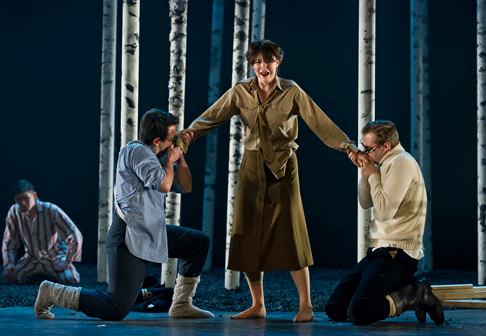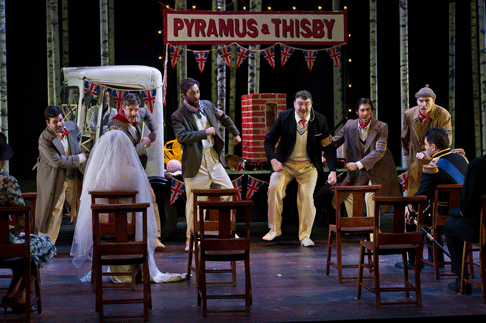![Eleanor Laugharne as Tytania and Barnaby Rea as Bottom [Photo by Clive Barda courtesy of Guildhall School of Music and Drama]](http://www.operatoday.com/MND_Guildhall_01.gif)
01 Mar 2012
A Midsummer Night’s Dream, GSMD
There were high hopes for the 2012 debut production of A Midummer Night’s Dream by the Guildhall School of Music and Drama’s Opera programme .
English Touring Opera are delighted to announce a season of lyric monodramas to tour nationally from October to December. The season features music for solo singer and piano by Argento, Britten, Tippett and Shostakovich with a bold and inventive approach to making opera during social distancing.
This tenth of ten Live from London concerts was in fact a recorded live performance from California. It was no less enjoyable for that, and it was also uplifting to learn that this wasn’t in fact the ‘last’ LfL event that we will be able to enjoy, courtesy of VOCES8 and their fellow vocal ensembles (more below …).
Ever since Wigmore Hall announced their superb series of autumn concerts, all streamed live and available free of charge, I’d been looking forward to this song recital by Ian Bostridge and Imogen Cooper.
Although Stile Antico’s programme article for their Live from London recital introduced their selection from the many treasures of the English Renaissance in the context of the theological debates and upheavals of the Tudor and Elizabethan years, their performance was more evocative of private chamber music than of public liturgy.
Evidently, face masks don’t stifle appreciative “Bravo!”s. And, reducing audience numbers doesn’t lower the volume of such acclamations. For, the audience at Wigmore Hall gave soprano Elizabeth Llewellyn and pianist Simon Lepper a greatly deserved warm reception and hearty response following this lunchtime recital of late-Romantic song.
For this week’s Live from London vocal recital we moved from the home of VOCES8, St Anne and St Agnes in the City of London, to Kings Place, where The Sixteen - who have been associate artists at the venue for some time - presented a programme of music and words bound together by the theme of ‘reflection’.
'Such is your divine Disposation that both you excellently understand, and royally entertaine the Exercise of Musicke.’
‘And there was war in heaven: Michael and his angels fought against the dragon; and the dragon fought and his angels, And prevailed not; neither was their place found any more in heaven … that old serpent … Satan, which deceiveth the whole world: he was cast out into the earth, and his angels were cast out with him.’
There was never any doubt that the fifth of the twelve Met Stars Live in Concert broadcasts was going to be a palpably intense and vivid event, as well as a musically stunning and theatrically enervating experience.
‘Love’ was the theme for this Live from London performance by Apollo5. Given the complexity and diversity of that human emotion, and Apollo5’s reputation for versatility and diverse repertoire, ranging from Renaissance choral music to jazz, from contemporary classical works to popular song, it was no surprise that their programme spanned 500 years and several musical styles.
The Academy of St Martin in the Fields have titled their autumn series of eight concerts - which are taking place at 5pm and 7.30pm on two Saturdays each month at their home venue in Trafalgar Square, and being filmed for streaming the following Thursday - ‘re:connect’.
The London Symphony Orchestra opened their Autumn 2020 season with a homage to Oliver Knussen, who died at the age of 66 in July 2018. The programme traced a national musical lineage through the twentieth century, from Britten to Knussen, on to Mark-Anthony Turnage, and entwining the LSO and Rattle too.
With the Live from London digital vocal festival entering the second half of the series, the festival’s host, VOCES8, returned to their home at St Annes and St Agnes in the City of London to present a sequence of ‘Choral Dances’ - vocal music inspired by dance, embracing diverse genres from the Renaissance madrigal to swing jazz.
Just a few unison string wriggles from the opening of Mozart’s overture to Le nozze di Figaro are enough to make any opera-lover perch on the edge of their seat, in excited anticipation of the drama in music to come, so there could be no other curtain-raiser for this Gala Concert at the Royal Opera House, the latest instalment from ‘their House’ to ‘our houses’.
"Before the ending of the day, creator of all things, we pray that, with your accustomed mercy, you may watch over us."
The doors at The Metropolitan Opera will not open to live audiences until 2021 at the earliest, and the likelihood of normal operatic life resuming in cities around the world looks but a distant dream at present. But, while we may not be invited from our homes into the opera house for some time yet, with its free daily screenings of past productions and its pay-per-view Met Stars Live in Concert series, the Met continues to bring opera into our homes.
Music-making at this year’s Grange Festival Opera may have fallen silent in June and July, but the country house and extensive grounds of The Grange provided an ideal setting for a weekend of twelve specially conceived ‘promenade’ performances encompassing music and dance.
There’s a “slide of harmony” and “all the bones leave your body at that moment and you collapse to the floor, it’s so extraordinary.”
“Music for a while, shall all your cares beguile.”
The hum of bees rising from myriad scented blooms; gentle strains of birdsong; the cheerful chatter of picnickers beside a still lake; decorous thwacks of leather on willow; song and music floating through the warm evening air.
![Eleanor Laugharne as Tytania and Barnaby Rea as Bottom [Photo by Clive Barda courtesy of Guildhall School of Music and Drama]](http://www.operatoday.com/MND_Guildhall_01.gif)
There were high hopes for the 2012 debut production of A Midummer Night’s Dream by the Guildhall School of Music and Drama’s Opera programme .
Instead of the usual cramped GSMD theatre, this took place in the Barbican Theatre, which allows much more scope for ambitious work, and training in theatre skills, part of the GSMD brief. At the Barbican, young artists of the future have a bigger platform in every way.
A magical effect to begin with. The mechanical curtain was imaginatively clothed in sparkling metal strips. Then, the set revealed a dormitory, perhaps some spartan public school whose fees don’t cover humane accommodation for the inmates. Fair enough, for Britten was traumatized at boarding school, and his music retraces lost innocence over and over again. Then in come the lovers, Demetrius, Lysander, Hermia and Helena appear in 1940’s military garb. Later, Bottom awakes in a bed suspended above the stage. If these images seem familiar, they’re derived. like collage, from several recent professional productions including the ENO, Garsington Opera and Glyndebourne. That’s not in itself a problem, since GSMD students are there to learn.
Perhaps this production was a collaborative effort, involving as many students as possible in the process, but Director Martin Lloyd-Evans might have exerted tighter editorial control to ensure a coherent vision. There are many levels in Shakespeare and in Britten, so A Midsummer Night’s Dream provides wonderful opportunities for young directors and designers to engage with many ideas. This time, though, everyone seemed to be playing safe. The designs (Dick Bird) don’t suggest that much thought has been put into the production. GSMD students are capable of very good work indeed. Read here about their production of Dialogues des Carmélites last year That was outstanding, and would have done credit to a professional house.
When the energy of the cast is engaged, however, there are excellent moments. The mechanicals, in particular, moved precisely, as if in a chorus line, each man perfectly synchronised, arms askew. (Movement by Victoria Newlyn). Very impressive, but individual personalities are not well defined. Not even Bottom, whom Shakespeare singles out for special treatment. It’s a wonderful role, which Barnaby Rea sang well but wasn’t called upon to develop theatrically. The lovers were well done, Ashley Riches’s distinctive voice instantly recognizable, even in anonymous uniform. We need good countertenors and Tom Verney’s Oberon had imposing presence. He’s very young so could well develop an interesting profile. Good singing from the choruses, particularly the quartet of fairies, who were vivacious and well blocked. Given the high calibre of GSMD’s Technical Theatre course participants, one might have expected more imaginative special effects to create the magic the staging lacked. At the Linbury Theatre a few years ago, Puck was played by a circus artist, abseiling from wires, as if he could fly.
 Sky Ingram as Helena, Stuart Laing as Lysander and Ashley Riches as Demetrius
Sky Ingram as Helena, Stuart Laing as Lysander and Ashley Riches as Demetrius
Nonetheless, best for last. Shakespeare and Britten wrote the Mechanical’s stage play with such wit that it’s impossible not to make it effective theatre. Now each singer made his mark, each evidently enjoying himself camping up and having fun. Theseus, Hippolyta and the lovers sneer, but Shakespeare and Britten knew that amateur dramatics have quaint charm.
Anne Ozorio
 The Mechanicals
The Mechanicals